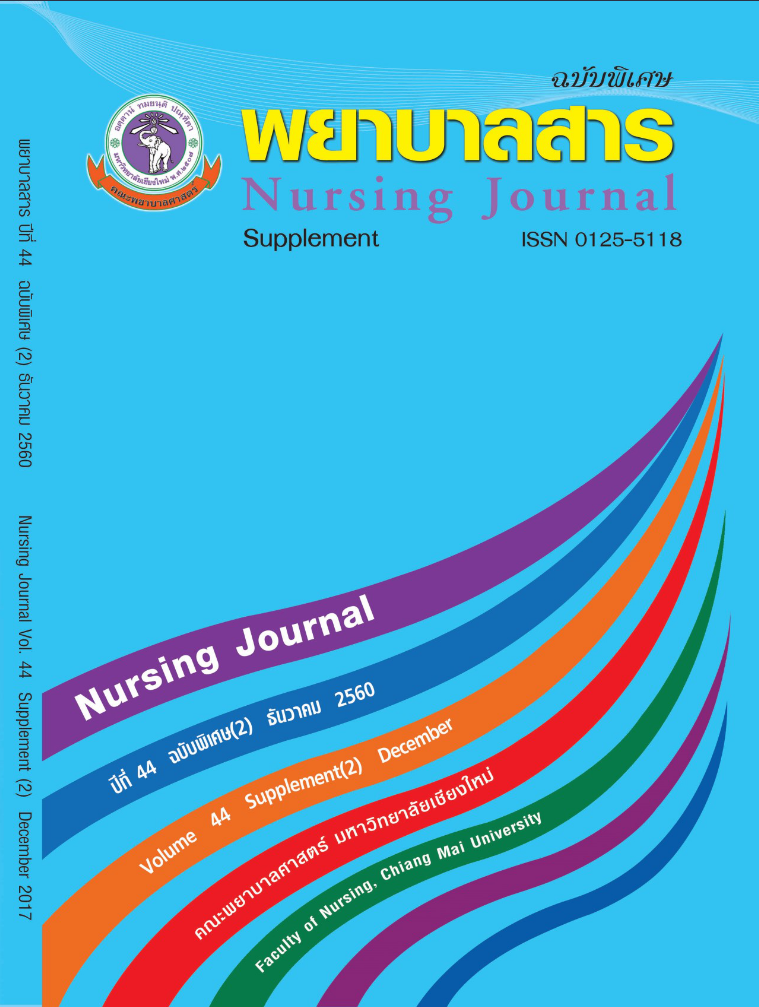Effects of a Self-Management Supporting Program on Self-Management Behaviors and Blood Pressure among Older Adults with Hypertension
Keywords:
Self-management supporting, Hypertension, Older adultsAbstract
Hypertension is a common chronic disease among older adults. This quasi-experimental research aimed to examine effects of a self-management supporting program on self-management behaviors and blood pressure among older adults with hypertension. Subjects included 52 hypertensive older adults who attended the Ban Huai San Phlapphla District Health Promoting Hospital. The subjects were purposively selected and randomly assigned into an experimental group and a control group, with 26 persons in each group. Subjects in the experimental group received self-management supporting program 1.5 – 2 hours per week, once a week for twelve weeks while those in the control group performed usual care. The research instruments consisted of the Hypertension Self-management Supporting Program and handbook for self-management among older adults with hypertension. The instruments used for data collection consisted of 1) self-management behaviors for older adults with hypertension questionnaire 2) perception of self-efficacy for older adults with hypertension questionnaire 3) self-management for older adults with hypertension recording form and 4) sphygmomanometer and stethoscope. Data were analyzed using descriptive statistics, t-test, Mann-Whitney U test and Wilcoxon matched-pairs signed-ranks test.
The results of study
The mean scores of self-management behaviors among older adults with hypertension in the experimental group (x̄ = 95.03, S.D. = 4.93) was statistically significantly higher than the control group (x̄ = 76.80, S.D. = 5.67) and higher than before the implementation of the program (x̄ = 76.26, S.D. = 8.35) (p < 0.001). Both systolic and diastolic blood pressure median scores in the experimental group (median = 110 and median = 70, respectively) were statistically significantly lower than the control group (median = 130 and median = 80, respectively) (p < .001 and p < .05) and lower than before the implementation of the program (median = 130 and median = 80, respectively) (p < .001, p < 0.001, respectively)
Results of this study indicate that the self-management supporting program is ability to reduce the level of blood pressure. Therefore, the lead to further proper for controlling high blood pressure among older adults with hypertension.
References
ตนเองในผู้สูงอายุโรคความดันโลหิตสูง. รามาธิบดีพยาบาลสาร, 20(2). 179-192.
เนติมา คูนีย์. (2557). การทบทวนวรรณกรรม: สถานการณ์ปัจจุบันและรูปแบบการบริการด้านโรคไม่
ติดต่อเรื้อรัง. กรุงเทพฯ: อาร์ต ควอลิไฟท์.
เบญจมาศ ถาดแสง, ดวงฤดี ลาศุขะ, และ ทศพร คำผลศิริ. (2555). ผลของโปรแกรมสนับสนุนการจัดการ
ตนเองต่อพฤติกรรมการจัดการตนเองและค่าความดันโลหิตของผู้สูงอายุที่มีความดันโลหิตสูง.
พยาบาลสาร, 39(4). 124-137.
มูลนิธิสถาบันวิจัยและพัฒนาผู้สูงอายุไทย. (2559). สถานการณ์ผู้สูงอายุไทย พ.ศ. 2558. กรุงเทพฯ:
อมรินทร์พริ้นติ้งแอนพับลิชชิ่ง.
วิมลรัตน์ ภู่วราวุฒิพานิช, จงกลวรรณ มุกสิกทอง, ศรินรัตน์ ศรีประสงค์, วารุณี พลิกบัว, ปิโยรส
เกษตรกาลาม์, สิริกาญจน์ หาญรบ, …ศรีสุดา เอกลัคนา. (2558). การทบทวนวรรณกรรมอย่าง
เป็นระบบเรื่องรูปแบบการดูแลผู้ป่วยโรคเรื้อรังและการสนับสนุนการจัดการตนเองในผู้ป่วยโรค
เรื้อรัง. กรุงเทพฯ: สถาบันวิจัยระบบสาธารณสุข.
สมาคมความดันโลหิตสูงแห่งประเทศไทย. (2558). แนวทางการรักษาโรคความดันโลหิตสูงในเวชปฏิบัติ
ทั่วไป. สืบค้นจาก http://www.thaihypertension.org.
Bandura. (1997). Self-efficacy: The exercise of control. New York: Freeman and Company.
Burns, N, & Grove, S. K. (2005). The practice of nursing research. Philadelphia: Saunders.
Fogari, R. & Zoppi, A. (2004). Effect of Antihypertensive Agents on Quality of Life in the Elderly.
Drugs Aging, 21(6). 377-393.
Lorig, K. R., & Holman, H. (2003). Self-management education: History, definition, outcome and
mechanism. The Society of Behavioral Medicine; 26(1). 1-7.
McManus, R. J., Mant, J., Bray, E. P., Holder, R., Jones, M. I., Greenfield, S., Hobbs, F. D.
(2010). Telemonitoring and self-management in the control of hypertension (TASMINH2): A randomised controlled trial. Lancet, 376(9736). 163-172.
Murman, D. L. (2015). The Impact of Age on Cognition. Seminars in hearing, 36(3). 111-121.
Xie, H., Cheng, C., Tao, Y., Zhang, J., Robert, D., Jia, J. & Su, Y. (2016). Quality of life in
Chinese family caregivers for elderly people with chronic diseases. Health and Quality of
Life Outcomes, 14(99).1-9.
Downloads
Published
How to Cite
Issue
Section
License
บทความที่ได้รับการตีพิมพ์เป็นลิขสิทธิ์ของวารสารพยาบาลสาร
ข้อความที่ปรากฏในบทความแต่ละเรื่องในวารสารวิชาการเล่มนี้เป็นความคิดเห็นส่วนตัวของผู้เขียนแต่ละท่านไม่เกี่ยวข้องกับมหาวิทยาลัยเชียงใหม่ และคณาจารย์ท่านอื่นๆในมหาวิทยาลัยฯ แต่อย่างใด ความรับผิดชอบองค์ประกอบทั้งหมดของบทความแต่ละเรื่องเป็นของผู้เขียนแต่ละท่าน หากมีความผิดพลาดใด ๆ ผู้เขียนแต่ละท่านจะรับผิดชอบบทความของตนเองแต่ผู้เดียว






